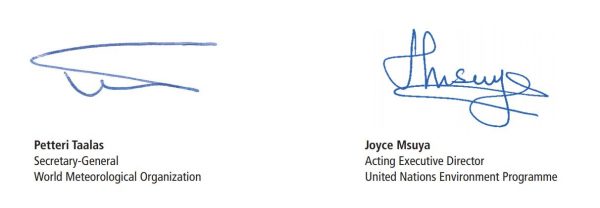During its three decades of existence, the IPCC has shed light on climate change, contributing to the understanding of its causes and consequences and the options for risk management through adaptation and mitigation. In these three decades, global warming has continued unabated and we have witnessed an acceleration in sealevel rise. Emissions of greenhouse gases due to human activities, the root cause of global warming, continue to increase, year after year.
Five years ago, the IPCC’s Fifth Assessment Report provided the scientific input into the Paris Agreement, which aims to strengthen the global response to the threat of climate change by holding the increase in the global average temperature to well below 2ºC above pre-industrial levels and to pursue efforts to limit the temperature increase to 1.5ºC above pre-industrial levels.
Many countries considered that a level of global warming close to 2°C would not be safe and, at that time, there was only limited knowledge about the implications of a level of 1.5°C of warming for climate-related risks and in terms of the scale of mitigation ambition and its feasibility. Parties to the Paris Agreement therefore invited the IPCC to assess the impacts of global warming of 1.5°C above pre-industrial levels and the related emissions pathways that would achieve this enhanced global ambition.
At the start of the Sixth Assessment cycle, governments, in a plenary IPCC session, decided to prepare three special reports, including this one, and expanded the scope of this special report by framing the assessment in the context of sustainable development and efforts to eradicate poverty.
Sustainable development goals provide a new framework to consider climate action within the multiple dimensions of sustainability. This report is innovative in multiple ways. It shows the importance of integration across the traditional IPCC working groups and across disciplines within each chapter. Transitions, integrating adaptation and mitigation for each sector, are explored within six dimensions of feasibility, showing both low hanging fruits and barriers to overcome. It also provides scientific guidance on strategies to embed climate action within development strategies, and how to optimize choices that maximize benefits for multiple sustainable development dimensions and implement ethical and just transitions.
In his address to the UN General Assembly in 2018, Secretary-General António Guterres quoted World Meteorological Organization (WMO) data showing that the past two decades have included eighteen of the twenty warmest years since record-keeping began in 1850.
“Climate change is moving faster than we are,” said Secretary-General Guterres. “We must listen to the Earth’s best scientists,” he added.
One month later the IPCC presented the Special Report on Global Warming of 1.5ºC, based on the assessment of around 6,000 peer-review publications, most of them published in the last few years. This Special Report confirms that climate change is already affecting people, ecosystems and livelihoods all around the world. It shows that limiting warming to 1.5ºC is possible within the laws of chemistry and physics but would require unprecedented transitions in all aspects of society. It finds that there are clear benefits to keeping warming to 1.5ºC rather than 2ºC or higher. Every bit of warming matters. And it shows that limiting warming to 1.5ºC can go hand in hand with achieving other global goals such as the Sustainable Development Agenda. Every year matters and every choice matters.
This Special Report also shows that recent trends in emissions and the level of international ambition indicated by nationally determined contributions, within the Paris Agreement, deviate from a track consistent with limiting warming to well below 2°C. Without increased and urgent mitigation ambition in the coming years, leading to a sharp decline in greenhouse gas emissions by 2030, global warming will surpass 1.5°C in the following decades, leading to irreversible loss of the most fragile ecosystems, and crisis after crisis for the most vulnerable people and societies.
The Special Report on Global Warming of 1.5°C supports efforts by the WMO and United Nations Environment Programme for a comprehensive assessment of our understanding of climate change to help step up action to respond to climate change, achieve climate-resilient development and foster an integrated approach to the provision of climate services at all scales of governance.
The IPCC worked in record time to deliver this report for the 24th Conference of Parties (COP24) to the United Nations Framework Convention on Climate Change (UNFCCC) and the Talanoa Dialogue. We would like to thank Hoesung Lee, Chair of the IPCC, for his leadership and guidance in the preparation of this Special Report. We commend the work undertaken by the authors of this Special Report and the many contributing authors and reviewers within a timeline of unprecedented severity; the leadership of the Co-Chairs of Working Groups I, II and III: Valérie Masson-Delmotte, Panmao Zhai, Hans-Otto Pörtner, Debra Roberts, Jim Skea and Priyadarshi R. Shukla; the oversight by the Bureau members of Working Groups I, II and III; and the implementation by the Technical Support Unit of Working Group I, supported by the Technical Support Units of Working Groups II and III. We are also grateful for the responsiveness of the international research community, who produced the knowledge assessed in the report, and thank the reviewers of the report for the thousands of comments that helped the authors strengthen the assessment.
Every bit of warming matters, every year matters, every choice matters

